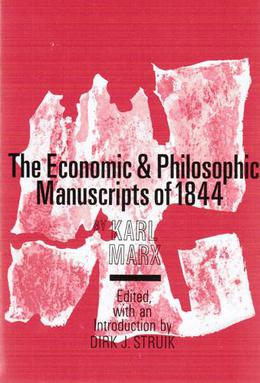
Economic and Philosophic Manuscripts of 1844
The Economic and Philosophic Manuscripts of 1844 (German: Ökonomisch-philosophische Manuskripte aus dem Jahre 1844), also known as the Paris Manuscripts[1] (Pariser Manuskripte) or as the 1844 Manuscripts,[1] are a series of notes written between April and August 1844 by Karl Marx. They were compiled and published posthumously in 1932 by the Soviet Union's Marx–Engels–Lenin Institute. They were first published in their original German in Berlin, and there followed a republication in the Soviet Union in 1933, also in German.
Editor
The Manuscripts provide a critique of classical political economy grounded in the philosophies of Georg Wilhelm Friedrich Hegel and Ludwig Feuerbach. The work is best known for its articulation of Marx's argument that the conditions of modern industrial societies result in the estrangement (or alienation) of wage-workers from their own products, from their own work, and in turn from themselves and from each other.[2] Marx argues that workers are forced by the capitalist productive process to work solely to satisfy their basic needs. As such, they merely exist as commodities in a constant state of drudgery, evaluated solely by their monetary value, with capital assuming the status of a good in and of itself.
The publication of the Manuscripts greatly altered the reception of Marx by situating his work within a theoretical framework that had until then been unavailable to his followers.[3] While the text's importance was often downplayed by orthodox Marxists as being "philosophical" rather than "scientific", the notebooks provide insight into Marx's thought at the time of its first formulation.
Context[edit]
The Manuscripts were composed during the summer of 1844,[4] when Marx was 25 or 26 years old.[5] Marx was at this time resident in Paris, then seen as the center of socialist thought. Several members of the philosophical milieu that he then belonged to, the Young Hegelians, had moved to Paris in the previous year to establish a journal, the Deutsch–Französische Jahrbücher.[6] Marx himself had taken up residence in 38 Rue Vaneau, in the Left Bank of the city, in October 1843.[7] In Paris, he came into contact with German revolutionary artisans and secret meetings of French proletarian societies.[8] It was in this period that Marx made the acquaintance of Pierre-Joseph Proudhon, Louis Blanc, Heinrich Heine, Georg Herwegh, Mikhail Bakunin, Pierre Leroux and most importantly, Friedrich Engels.[9]
The Manuscripts evolved from a proposal Marx had made in the Jahrbücher to write separate pamphlets critiquing the various topics of Georg Wilhelm Friedrich Hegel's philosophy of law — law, morals, politics, etc. — ending with a general treatise that would show their interrelations.[4] The notebooks are a fragmentary, incomplete work, that range from extracts from books with comments, loosely connected notes and reflections on various topics, to a comprehensive assessment of Hegel's philosophy.[10]
The text marks the first appearance together of what Engels described as the three constituent elements in Marx's thought: German idealist philosophy, French socialism, and English economics.[11] In addition to Hegel, Marx addresses the work of various socialist writers, and that of the fathers of political economy: Francois Quesnay, Adam Smith, David Ricardo, Jean-Baptiste Say and James Mill.[12] Die Bewegung der Produktion by Friedrich Wilhelm Schulz is also a key source.[13][14] Ludwig Feuerbach's humanism is an influence that underlies all of Marx's notes.[15]
Because the 1844 Manuscripts show Marx's thought at the time of its early genesis, their publication in the twentieth century profoundly affected analysis of Marx and Marxism.[1] At the time of their first publication, their most striking feature was their dissimilarity to the philosophy of dialectical materialism that was official within the Soviet Union and the European Communist Parties.[5] The Manuscripts offer a trenchant analysis of Hegel that is far more difficult and complex than the "dialectics of nature" that Georgi Plekhanov and his disciple Lenin had derived from Engels's Anti-Dühring.[16]
Terminology[edit]
István Mészáros notes that the language and terminology of the Manuscripts are one of the work's main difficulties.[10] He mentions that a key term "Aufhebung" can be translated from German to English simultaneously as "transcendence", "suppression", "preserving" and "overcoming".[17] Christopher J. Arthur comments that the term, which appears in Hegel's Science of Logic, has in ordinary language the double meaning of "to abolish" and "to preserve". Arthur translates the word as "supersede" when the stress is more on abolition, and as "sublate" when the emphasis is more on preservation.[18] Gregory Benton translates the word as "transcendence" and "supersession", and notes that Marx's concept of "critique" is an instance of this double movement.[19]
A second terminological difficulty is the translation of the German words "Entäusserung" and "Entfremdung".[18] While both words can be translated to English as "alienation", Entfremdung is often translated as "estrangement" and Entäusserung as "alienation", to draw a distinction between the two concepts.[20] Christopher J. Arthur notes that Entäusserung is an unusual German word that can also be translated as "renunciation", "parting with", "relinquishment", "externalization", "divestiture" or "surrender". Arthur believes "externalization" is the closest of these translations, but he avoids using this word as it may be confused with a distinct term that Marx uses elsewhere: "Vergegenständlichung" or "objectification". Arthur claims "Entfremdung" is a narrower concept than "Entäusserung" in that it applies only to cases of interpersonal estrangement. He takes estrangement to be a state and alienation to be a process.[18]
The dialectical structure of Marx's theory is another difficulty of the text, as the definition of certain key concepts can be hard to understand for those trained in positivist and empiricist philosophical traditions. What is more, the meaning of certain terms borrowed from Marx's contemporaries such as Feuerbach is often changed by Marx's appropriation of them.[21]